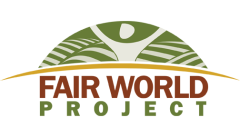
Hershey acknowledges child labor in its supply chain
By Corporate Accountability Lab (CAL) and Fair World Project (FWP)
Lawsuite below.
Last month, CAL reached a key point in our consumer protection case against Hershey and Rainforest Alliance, which we filed to stop misleading marketing about sustainability in the cocoa supply chain. For almost a year and a half, the defendants have dragged out this case, using legal procedures to delay progress. Now, Hershey and Rainforest Alliance have filed motions to dismiss the case, and their arguments for doing so are pretty astounding
In its motion, Hershey acknowledged “the existence of child labor and high deforestation rates” in its cocoa supply chain, problems that Rainforest Alliance certification isn’t solving. But Hershey claims it’s not guilty of false advertising because it has “publicly acknowledged these challenges,” including its failure to eradicate child labor, child trafficking, and deforestation in its supply chains. Hershey explains that its claims about its cocoa supply chain are merely “aspirational in nature” – essentially that they are trying, albeit slowly and unsuccessfully, to eliminate human rights and environmental abuses in its supply chains. Yikes!
Rainforest Alliance, meanwhile, alleged that it never claimed the green frog certification meant that there were no human rights or environmental abuses on certified farms, instead stating that the certification seal “represents [Rainforest Alliance’s] vision of sustainability as a journey of continuous improvement.” We believe that is not what consumers think the symbol means. Rainforest Alliance also glosses over the fact that its standards mean little when – as in so many cases – cocoa farmers in West Africa either don’t know they are certified or ignore the certification standards because they are too expensive to comply with.
At CAL, we have seen over and over again that certification schemes like Rainforest Alliance are not set up to eliminate human rights and environmental abuses in cocoa supply chains. If they were, they would require companies to pay a living income, have real community-based monitoring of farms, and establish long-term contracts with individual farmers. Rainforest Alliance does none of these things, instead papering over abuses with its little green frog. Hershey uses the logo as marketing, a way to signal to consumers that they are taking steps to clean up their supply chains without doing the hard work of actually changing how they source cocoa.
We still have a ways to go fighting for a more equitable cocoa industry. Hershey and Rainforest Alliance’s responses to our complaint have shown just that.
Join with CAL to fight big chocolate.
In Solidarity,
CAL.
CAL FILES SUIT AGAINST HERSHEY AND RAINFOREST ALLIANCE
Corporate Accountability Lab (CAL) is excited to announce that on October 27, 2021 we filed suit against Hershey and the certification scheme Rainforest Alliance in a consumer protection case in Washington, D.C. Superior Court. CAL, as the plaintiff in the case, is suing the defendants -- Hershey and Rainforest Alliance -- for false and deceptive marketing representations on certain Hershey chocolate products. We are bringing suit under the Washington, D.C. Consumer Protection Procedures Act (“CPPA”), a consumer protection statute that allows public interest organizations like CAL to sue on behalf of the general public.
The West African cocoa industry continues to suffer from endemic issues of child labor, forced child labor, and farmer poverty -- a result of low prices that wealthy multinational companies pay for cocoa. Meanwhile, social auditing and certification schemes like Rainforest Alliance, which purport to help farmers produce cocoa “sustainably,” are failing them. Over the past year, CAL’s investigators have documented instances of hazardous child labor on Rainforest Alliance certified farms in different parts of Cote d’Ivoire and spoken with farmers who explain that they don’t earn enough from cocoa farming to support their families. As one father explained, “They tell us that children are not supposed to work but they are the ones who help me feed the family. Children work in the plantations because the cooperatives and companies treat us so badly that we need to make children work on the plantations.”
Although a consumer protection action may not be a traditional form of human rights litigation, we think it’s vital to shed light on issues of child labor and exploitative working conditions in the West African cocoa industry using every available tool. Hershey benefits financially from cheap cocoa supplies, while Rainforest Alliance distracts from the real issues in Hershey’s supply chain by putting their seal on products. Not only are consumers who want to buy ethically produced cocoa misled by Rainforest Alliance’s seal, these labels also allow companies to avoid liability for their role in perpetuating human rights violations in cocoa supply chains.
To learn more about the case, you can read the complaint here and a press release here. You can also read this blog describing incidences of hazardous child labor on Rainforest Alliance certified cocoa farms in Cote d’Ivoire here.
Allie Brudney is a Staff Attorney at Corporate Accountability Lab.


